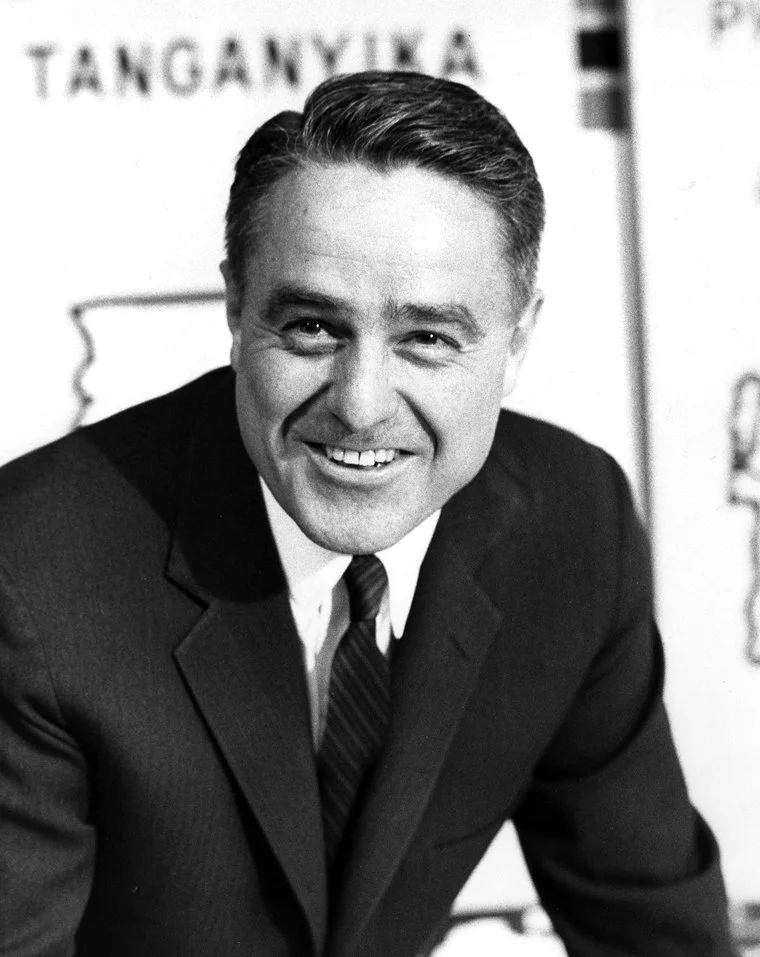Robert Sargent Shriver, Jr., 1966
Robert Sargent Shriver, Jr., devoted his energy and talents during his lengthy public career to what he described as peace-building work. Shriver called peace-building a "formula for practical idealism." He established his peace-builder legacy by developing and directing government programs and policies that promote human dignity and social welfare.
Shriver, who was married for 56 years to Eunice Kennedy, sister to President John Fitzgerald Kennedy, was born November 9, 1915, in Westminster, Maryland. As a member of the Kennedy family's political dynasty, Shriver was thrust into prominence on the national scene when he accepted the responsibility for implementing major federal government social initiatives in the 1960s.
Shriver's public service and civic leadership accomplishments included his significant role in the success of the Peace Corps volunteer program created in 1961 during President Kennedy's administration as well as the Office of Economic Opportunity, the umbrella agency for the War on Poverty programs initiated in 1964 during President Lyndon Johnson's administration.
Shriver served as the first director of both the Peace Corps and the Office of Economic Opportunity, which was described as a domestic Peace Corps. During Shriver's tenure leading the Peace Corps (1961-66), he developed service programs in 55 developing countries with more than 14,500 American volunteers. The Corps became the fastest growing peacetime agency in U.S. history. Shriver saw firsthand what the volunteers were accomplishing when he traveled a total of more than 350,000 miles on numerous visits to Peace Corps outposts in dozens of countries.
From 1965 to 1968, Shriver directed the Office of Economic Opportunity, which became an umbrella agency for federal antipoverty efforts. The Office of Economic Opportunity eventually branched into many programs, including Volunteers in Service to America (VISTA), Community Action Program (CAP), Job Corps, Head Start, and the Neighborhood Youth Corps.
When Shriver (who was known as "Sarge" from childhood) died January 18, 2011, at age 95, President Barack Obama said: "Sarge came to embody the idea of public service."
After concluding his Peace Corps and War on Poverty work In 1968, Shriver was appointed U.S. ambassador to France, a difficult diplomatic posting due to the United States' strained relationship with French President Charles de Gaulle. Shriver, the peace-builder, established a working friendship with de Gaulle, leading to a thaw in relations between the U.S. and France. While in France he was involved in the Paris Peace Accords meetings that eventually ended the Vietnam War and established peace in that country.
Shriver followed his success as ambassador by returning to the U.S. in 1970 to create the Congressional Leadership for the Future, an independent research and campaign organization supporting Democratic congressional candidates. He entered the political arena in 1972 when he was selected as the Democratic Party's nominee for the office of vice president. Presidential candidate George McGovern and Shriver lost in the general election to Richard Nixon and Spiro
Agnew.
As an undergraduate at Yale University, Shriver worked on the student newspaper, serving as senior editor. He graduated in 1938 with honors and in 1941 he was awarded a degree from Yale Law School. During World War II, he served in the Navy, including time as an antiaircraft gunner on the USS South Dakota in the Pacific off Guadalcanal. He was awarded a Purple Heart medal for wounds he
received in battle. As a young journalist after the war, he took a job as an assistant editor at Newsweek magazine, continuing his interest in journalism.
Shriver met his future wife Eunice Kennedy in New York in 1946 and they dated for several years. Her father, businessman and former ambassador Joseph P. Kennedy, offered Shriver a job and in the late 1940s appointed the young man manager of the Merchandise Mart in Chicago. At that time Kennedy's Merchandise Mart was the world's largest commercial building.
Shriver and Eunice Kennedy were married in 1953 and settled in Chicago. During this time Shriver embarked on his public career, serving as president of the Chicago Board of Education and the Catholic Interracial Council of Chicago. In these roles he addressed the country's racial conflicts by leading successful efforts to integrate Chicago's public and parochial school systems.
In 1968 Eunice Shriver founded the First International Special Olympic Games for athletes with intellectual disabilities. The inaugural Special Olympics was held in Chicago. "Sarge" Shriver joined his wife in their commitment to the Special Olympics mission; he became the organization's president in 1984 and chairman of the board in 1990. Under his leadership, the Special Olympics expanded its international sports programs for young people around the world. In his later years Shriver remained active in the Shriver National Center on Poverty Law, an advocacy organization that Shriver founded in Chicago in 1967 as the National Clearinghouse for Legal Services.
Shriver's wife of 56 years died in 2009 at the age of 88. Shriver died in 2011; he was 95 years old. The Schrivers had five children and 19 grandchildren.
In 1966 Shriver was presented the Pacem in Terris Peace and Freedom Award. During his life Shriver was recognized with numerous other honors and awards, including the Presidential Medal of Freedom presented by President Bill Clinton in 1994. Shriver also received honorary degrees from universities around the world.
Robert Sargent Shriver, Jr., deserving of accolades, for a long and productive life of service to others through his peace-building idealism and achievements.
By Steven Modzelewski

